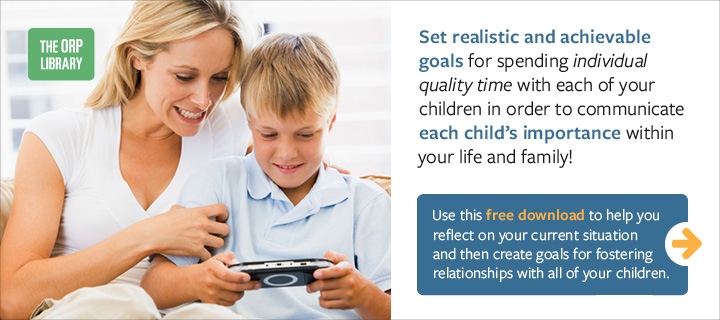When Children with Special Needs Have Siblings
Written By: Geoff Campbell
Resource Creation By: Bridget Morton
Design By: Sunny DiMartino
Mary slumped into the overstuffed faux-leather recliner and let out a sigh.
It had been a long day that began inauspiciously when George hadn’t wanted to get ready for school. His favorite shorts and polo shirt were in the laundry. And although a nearly identical set of clothes was clean and ready to go, Mary knew from experience that George wouldn’t settle for anything else.
She eventually ended the standoff by giving the clothes a spritz of fabric softener and a quick tumble in the dryer.
George’s younger brother, Mike, had actually suggested the solution. “Just put some deodorant on them, Mom,” Mike had said. “We’re burning daylight here and I need to get to school on time.”
Mary smiled at the recollection. One consequence of George being a child with autism spectrum disorder (ASD) was that his brother, Mike, was mature beyond his nine years. In the mornings, he often took it upon himself to prepare George’s breakfast of cereal and toast. And he was also always sure to let Mary or her husband, Jim, know when George’s favorite cereal—Frosted Flakes—was running low. Mike had learned as well as anyone that George thrived on predictability, and he did his part to make sure the morning routine ran smoothly.
Mary wasn’t sure when it happened, but there were days when she looked at Mike and saw a kid who acted like a twenty-year-old man rather than a nine-year-old boy. She wondered whether that was a good thing. She didn’t like how Mike seemed to worry a lot—especially more recently. It’s hard enough raising a child with ASD, Mary thought. But when that child has a sibling—there’s no manual for that either.
“Mom!” Mary was shaken from her reverie by a shout from the other room. Mike wanted her attention. Mary just wanted to take a long, hot bath.
“Yes, dear,” she said. “What do you need?”
“The only thing in the fridge is some milk and broccoli,” Mike said. “Oh! And a gross shriveled apple.”
Mary felt a weight descend upon her shoulders and chest. She’d forgotten to go to the grocery store.
It was on her list, after a trip to the Department of Motor Vehicles to renew the license plate and a run to the mall for cosmetics. She’d gotten caught up in a lengthy bureaucratic ordeal at the DMV when she had trouble finding her current insurance card. At the mall, she’d run into a high school acquaintance who seemed to think they were the best of friends. By the time she was done chatting, Mary had had to rush to the school to pick up the kids.
Mary took a deep breath, stood up, and walked into the kitchen. Mike was still peering into the empty refrigerator. George was walking the length of the room singing “America the Beautiful.” He’d learned it at school three weeks ago and had been singing it at home ever since.
“Boys, I was thinking that we’d go out for dinner tonight,” Mary said. “Your dad is still out of town for business, so why don’t we have an adventure?”
“I kind of wanted to stay home,” Mike said. “Can we do takeout? We can eat in the living room. That would be an adventure.”
“What do you think, George?” Mary asked.
“Hey, wait a minute,” Mike said. “How come George always gets to decide? Don’t I count too?”
“Of course you do,” Mary said. She realized Mike had a point. In matters both large and small, George sometimes seemed to possess veto power over family activities. Mary and Jim had never intended it that way. But because George could easily suffer from sensory overload in busy public settings, Mary and Jim had developed a wariness about even simple outings. Now Mary recognized that this informal system wasn’t fair to Mike. So she added, “I’m not letting him decide totally. I was just introducing the idea to him. What do you think, George?”
George was still walking back and forth, singing. He stopped long enough to ask, “Why is Dad out of town?” He started walking again before abruptly saying, “What’s Dad going to eat?”
“We talked about this before,” Mary said. “He had to go talk to some people about a new building. I don’t know what he’s going to eat, but you can ask him when he calls tonight.”
“When’s Dad going to call?” George asked.
“I don’t know,” Mary said. “Eight, maybe.”
“Will we be back by then?”
“Of course,” Mary said. “Let’s go to the chicken place. We can get take-out food there—a baked chicken and those apples you like so much. We’ll eat it here so we’ll be home when your dad calls.”
“Will the man with the beard be there?” The last time the family had gone to the restaurant, the cashier had a beard. George had asked him if he was Paul Bunyan.
Mike was growing impatient, but the memory of George’s interaction with the bearded man made him smile. “If he is, you can ask him if he’s Paul Bunyan again,” he said to George. Still smiling, he handed his mother her car keys. “Let’s go. I’m hungry.”
Mary felt a sense of relief. It would be easier to get the boys in-and-out with a take-out order than it would be to navigate the grocery store. Mike, who sometimes felt ignored in favor of George’s needs, would still get what he wanted—to eat at home. The only thing that seemed to matter to George was that they not miss Dad’s call. Victory, Mary thought, everyone wins.
***
Mary and Jim had initially downplayed George’s developmental delays. The sixth-month mark came and went and George never smiled. He also avoided eye contact. The pediatrician said that, although it was much too soon to diagnose, these signs were of concern as they were associated with ASD and recommended they contact the County Birth to 3 Program for an evaluation. Mary and Jim refused to think about that possibility at first, instead convincing themselves George was a late bloomer and would just take longer than usual to develop normally. But by sixteen months, when George wasn’t using any words and still avoided eye contact with anyone, Mary and Jim resigned themselves to the fact that he might have ASD. By the time George was officially diagnosed at three years of age, Mary and Jim were fully committed to doing whatever they could to help their son.
For example, they’d learned by trial and error how important it was to foreshadow or prepare George for things he was likely to encounter when they went out in public. Even a family gathering at Mary’s parents’ house for Thanksgiving required a rigorous briefing, with pictures, including everyone who was expected to be there and what cars they were likely to drive to get there. George needed order and predictability to feel comfortable and less anxious.
But Mary and Jim couldn’t prepare him for everything, and sometimes George, especially when overstimulated, would have noisy meltdowns. They needed then to change their definition of success. If they could go shopping or dine at a restaurant without George screaming, and have a reasonably good time, then that was a positive outing.
When they learned they were expecting with Mike, they both harbored fears their second child might also have ASD. But their concerns ebbed over time. Mike smiled before he was six months old, and by the time he was one year old, he was pointing at objects and gurgling. When he was two, he was putting together simple sentences, which actually put him ahead of normal developmental markers.
One night after putting Mike in his crib, Mary wrapped an arm around Jim and rested her head on his shoulder. “He’s going to be just fine,” she said.
But as Mike continued to grow and develop, Mary and Jim realized they faced a whole new set of challenges, first among them how to make sure each of their children received the attention and support they needed, especially when George always seemed to require more.
***
When he was five, Mike said he wanted to play tee-ball at the local youth center. Jim was especially ecstatic. When he and Mary were first expecting with George, Jim had visions of playing catch with his son. That dream faded quickly, and Jim had been reluctant to revive it with Mike.
But when the family attended Mike’s first game, it turned into a disaster. First George couldn’t sit still, and Mary and Jim had to take turns following him around. Then, as the action on the field heated up and parents yelled and cheered, the noise became too much for George. He first covered his ears with his hands and squinted his eyes in an attempt to shield himself from the stimulation. He then began flapping his hands and wailing. Jim eventually had to take George to the car until the game was over.
After the game, Mike was red-faced and beaming. He ran up to his father and said, “See my home run?”
Jim shot a glance at Mary, who nodded imperceptibly, and then looked back at Mike’s smiling face. “You are the man!” Jim said, smiling. “You going to give me a high-five or keep me hanging?” He just didn’t have the heart to tell Mike he was at the car with George.
For the next game, Jim had to leave town for a business trip, and Mary was left to fend for herself. By the time the game started, she’d given up any hope of seeing Mike play. She took George to the car to wait for the game to end, but George quickly grew bored with sitting. He was getting louder and near to throwing a tantrum when Mary reminded him about his electronic tablet, on which she’d downloaded a phonics-based reading application that George enjoyed.
For the rest of that season, any time Jim was out of town on a game day, Mary made arrangements for Mike to get a ride with the parents of a teammate. Mary would always make a fuss over him when he returned home. She’d ask him lots of questions about the game and how he did. Finally, one day Mike said with tears in his eyes, “You wouldn’t have to ask so many questions if you just came to my game for once! All you two care about is George!”
Mary felt like she’d been stabbed in the heart, but she also knew that Mike had a point about how they spent time with their sons. So when Jim was home, Mary and Jim started to take turns attending games. That way one of them was at home with George while the other got to watch Mike play. It wasn’t a perfect solution, but it was one way to make Mike feel like he was just as special to them.
Whether Mary or Jim went to his game, they always made sure to stop at a local ice cream shop on the way home. They’d enthusiastically talk to Mike about his game while treating him to a strawberry sundae, his favorite. Mike enjoyed the extra attention. After one game, Mary watched as Mike attacked his sundae. She resisted the impulse to dab his chin when some melted ice cream dripped. “Your dad and I really love you, Mike,” she said.
“I know,” Mike said, trying but failing to suppress a smile. “Sometimes George just needs more attention.”
“You’re a special kid,” Mary said.
“I know that, too,” Mike said with a laugh. “You going to drink your shake or just let it melt?”
***
Jim struggled with guilt because his job so often took him out of town. He knew how difficult it could be to give both boys the love and attention they deserved even when he and Mary were both there. And though giving each of their sons individual attention was easier now that they were nine and almost thirteen—their individual interests made it easier to plan one-on-one outings—Jim still couldn’t shake the feeling that Mary bore the brunt of the childrearing burden.
So when he was home, Jim made a special attempt to spend more “quality time” with Mike and George doing what each of the boys found interesting. Although his redoubled efforts with the boys made it even more difficult for him to spend time with Mary, he was happy that he was at least helping more with the boys. For example, George sometimes enjoyed going to large discount department stores, not because he wanted to buy anything but because he wanted to get the receipts from any purchases. So Jim would explain to George that he needed to buy some things, mention the sorts of things they might encounter while they were out, and then take George with him, making sure to hand the receipt to George after the purchase.
Mike didn’t much care for shopping, but Jim would spend time with him by playing catch in the backyard or taking him to a movie, an activity George rarely had the patience for.
Sometimes, though, Jim and Mary understood they needed to give their sons time alone. Sometimes, also, Jim and Mary needed some time alone as a couple, and do some of the simple things like go out for dinner, or see a play—activities they both loved doing before they were married. It just seemed like there was never enough time for everyone and everything.
One Saturday afternoon Mike went into his brother’s bedroom. George was holding a stack of grocery store receipts. He always liked to get paper souvenirs from anywhere he visited, whether it was a receipt or takeout menu.
“Want to read?” Mike asked.
“No,” George said.
“C’mon,” Mike implored. “It’ll be fun. I’ll read to you if you want?”
“No. Get out,” George said. He went to a shelf, pulled out a children’s book about St. Francis, then plopped onto a bean bag chair.
Mike sat on the floor near his brother, clutching a colorful book based on a superhero comic book series.
Mary and Jim tiptoed to the bedroom door to peek in on the boys.
“Hey, George,” Mike said. “We’re both reading books about superheroes.”
Jim squeezed Mary’s hand. Mary covered her mouth with her other hand as she felt tears well in her eyes. “It’s like Mike’s the older brother. He’s trying so hard to help,” she whispered.
***
Weeks later, Jim was out of town again, and Mary had endured another long day. She had spent several hours volunteering at the kids’ school, and she wanted nothing more than to be able to curl up on the couch and watch a movie. When George put on headphones to listen to music and headed to his room, Mary felt a sense of relief. She knew he could occupy himself until bedtime with his music.
Mary picked up the television remote, but before she could hit the power button, Mike walked in.
“George is done for the day,” Mike said. “You know how he is with his music.”
Mary hesitated. For a millisecond, she thought how long it had been since the last time she’d been able to watch a movie uninterrupted. But when she took a long look at Mike, she felt a sense of warmth run through her body. He looked so much like Jim. She smiled. “I do,” she said.
“Play a game with me?” Mike asked tentatively. He saw the remote in Mary’s hand. “Maybe a game of Monopoly?”
Mary’s eyes glazed momentarily. She still felt like watching a movie. But she also knew that opportunities to spend one-on-one time with Mike were rare. “Sure,” Mary said. “But I get to be the shoe.”
“You can have it,” Mike said. “I like the wheelbarrow.”
Mike took another look at the remote Mary still held in her right hand. He arched his eyebrows, smiled, and said, “You can still turn on the TV. Just no movies with kissing in it.”
Mary put the remote on the couch and wrapped her arms around Mike. “No way, kiddo. I’m not sharing you tonight.”
This story is part of a series based on the experiences of parents, educators and the staff of Genesee Lake School, a nationally recognized provider of services for students with special needs. GLS is part of MyPath, an employee-owned family of companies whose mission is to make a difference in the lives of people with disabilities.

Sign Up to Receive New Posts
We promise not to spam you or share your information with anyone. And you can unsubscribe at any time . . . although we hope you stay a while!





